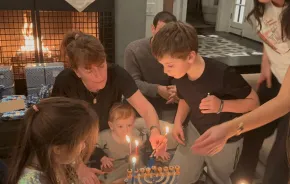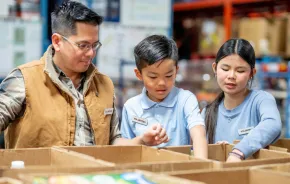An unknown voice on the other end of the line…Could she just come and get the child?
Within an hour, Jane, a single 62-year-old mother and grandmother, was driving across three counties in Western Washington to reach a child at risk. Not just any child — her 2-year-old grandchild. On the ride back home to Thurston County, Jane began to consider the challenges immediately before her. Her grandbaby had come with a car seat — and nothing else. No diapers, no medications, no clothes, no food. She strained to remember if her granddaughter had an allergy to wheat — or was it milk products? She wondered about medical coverage and what she would do if the child was sick. She wondered where to find a pediatrician — it had been nearly 20 years since she had needed one. She realized she would have to call in sick for work tomorrow but wondered what she would do for child care the day after that. How many days will there be? How much does child care cost? She hadn’t planned for this. Both Jane and her granddaughter began to cry. They cried all the way home.
Two years later, Jane is still raising her grandchild. Both report that they are doing well. Jane (not her real name) says that while she would do it again, it wasn’t easy. Jane is a participant in Thurston County’s “Kinship Conversations” support group, a program of Family Education and Support Services. Jane says: “The Support group and the friends I have made there keep me going. They are my lifeline.”
While extended families have always helped with child-rearing, grandparents are increasingly becoming primary caretakers. Nationwide, an estimated 2.2 million children are cared for by relatives, 58 percent more than in 1990. Washington State has experienced a similar trend over the past decade. Relative caregivers are now rearing more than 35,000 children in Washington, representing approximately one out of every 50 children in the state.
When a child falls on hard times and their mom or dad are not available to guide and protect them, either the state system steps in with foster care, or, more often, someone within the family takes the kids home. Kinship Care represents the most desirable out-of-home placement option for children who cannot live with their parents. It offers the greatest level of stability by allowing children to maintain their sense of belonging, and enhances their ability to identify with their family’s culture and traditions. Without these grandparents, the numbers of children in need of homes would overwhelm our foster care system.
The reasons behind this familial shift are rarely pleasant and may include child maltreatment, chemical dependency, mental illness, homelessness, incarceration, domestic violence, or the death of a parent. When a caregiver assumes the responsibility of caring for a relative’s child, even in the best of circumstances, the family will experience change. The sacrifices can be significant. Sometimes relative care can be overwhelming emotionally, physically, and financially.
At Family Education and Support Services (FESS) we offer supportive programs to those who serve children in the role of “parent.” Our mission is to ensure that every child has a healthy environment from which to develop by supporting the adult or caregiver who influences that environment.
Among those we admire the most are the grandparents and other relatives who have taken on the raising of a grandchild, or niece or nephew. This caring group of “parents” are often in their senior years and have set aside whatever other plans they had to dedicate their efforts to the well-being and safety of a child.
Every week at support group meetings, we see dedicated family members who share their stories and encourage each other in important ways. When someone is down, out of gas, discouraged or fearful, they are not alone. Support group meetings are a place to be heard, to find compassion and sometimes a place to find hope. There is laughter, there is listening and there are tears.
Some nights, a grandparent will shuffle in, sit down, and say, “I was not coming here tonight. I am tired and worn out. But my grandchild wanted to see his/her friend in the other room.” Children find support at group meetings, too.
All services are offered at no cost to participants. It has been an honor to have the opportunity to meet and support relative caregivers for the past fifteen years. These are the most competent, able, determined and discerning parents we have had the privilege of supporting. They are not victims, and they will not be distracted from their dedication to the well-being of the children in their care.
Relative caregivers are our teachers, our inspiration, and a tremendous gift to the children of our community.
Family Education and Support Services is a ParentMap Giving Together partner. For more information, call 360-754-7629.









